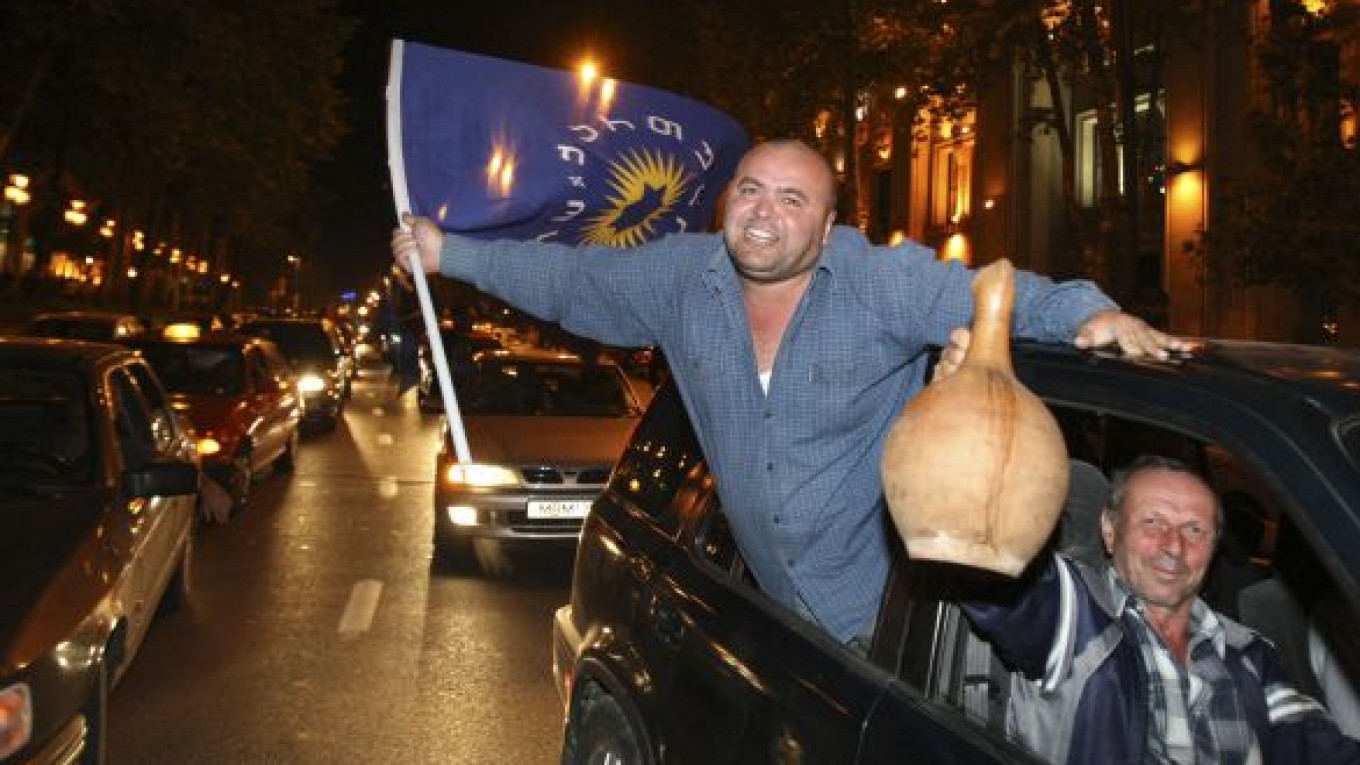Prime Minister Dmitry Medvedev praised the results of Georgia's parliamentary elections, in which the main opposition coalition defeated the party of President Mikheil Saakashvili.
"If these results remain, Georgia's political landscape will become more diverse. You can only welcome this, because it means that more constructive and responsible forces will appear in parliament," he told reporters during a visit to the Dagestani capital, Makhachkala.
Medvedev added that United Russia, the pro-Kremlin party he leads, was ready for dialogue about the future of Russo-Georgian relations.
On Tuesday, Saakashvili admitted that his party had lost Monday's parliamentary elections.
"Democracy works so that the Georgian people make decisions by majority, and this is what we hugely respect," Saakashvili said in a televised address, according to a? ? of the speech posted on his website. "At the same time, as party leader, I would like to state that the United National Movement is switching to opposition from now on."?
The election was won by the opposition Georgian Dream coalition, led by billionaire businessman Bidzina Ivanishvili. Georgian Dream won 54 percent of the vote, while Saakashvili's United National Movement got 41 percent, the state-owned PIK TV channel? ? on its website late Tuesday. The figures were based on data from almost 50 percent of precincts.?
Saakashvili's admission was widely seen as historic because Georgia has not seen a power handover without revolution in its post-Soviet history.
The parliamentary elections in Georgia are expected to be decisive for the country's future because the parliament will elect the next prime minister, who will become the country's most powerful political figure after a recent constitutional reform.
The reform goes into effect after October 2013, when Saakashvili's second five-year term expires. He is barred from running for another term.
It remains unclear what political role Saakashvili, who himself came to power in 2003 after a peaceful revolution triggered by a rigged parliamentary vote, will play until then.
Ivanishvili called on Saakashvili to step down Tuesday.
"If he resigns, calls early presidential elections and a new constitutional prime minister is elected, everything will be fine. Otherwise there will be considerable problems," he told reporters at his party headquarters, Interfax reported.
Saakashvili said Tuesday that he still fundamentally disagrees with his opponents' positions.
"There are very deep differences between us, and we believe that their views are extremely wrong," he said.
He also praised the achievements of the Rose Revolution of 2003 as "the most important achievement in centuries," an event that "turned Georgia into one of the most central countries."
A staunch U.S. ally, Saakashvili has forcefully pushed for his country's integration into the West, lobbying for membership in NATO and the European Union.
This deeply antagonized Moscow, which has denounced NATO's enlargement as a threat to regional security. In August 2008, four months after NATO promised Georgia membership at a summit in Bucharest, Georgian forces attacked Tskhinvali, the regional capital of separatist region South Ossetia.
The attack was quickly fended off with the help of Russian troops, who then temporarily occupied large swaths of Georgian territory.
After the war, Moscow recognized the independence of South Ossetia and Abkhazia, the two regions that had broken away from Georgia in the early 1990s, and stationed large numbers of troops there.
Russia and Georgia subsequently severed diplomatic ties, and the Kremlin has refused any contact with Saakashvili, calling him a war criminal. Saakashvili in turn regularly warned of a renewed Russian invasion, which he said would aim at deposing him. He issued similar warnings during the election campaign.
Two senior Federation Council senators said Tuesday that the unresolved dispute over Abkhazia and South Ossetia makes serious improvement seem unlikely.
"The train has left under Saakashvili, and I cannot imagine what could happen to make Russia go back on its recognition of Abkhazia and South Ossetia," Mikhail Margelov, the chairman of the Federation Council's Foreign Relations Committee, told Interfax.
Viktor Ozerov, the chairman of the upper house's Defense and Security Committee, said that any Georgian government was unlikely to improve ties.
"It is unlikely that those who replace the current leadership will recognize these territories' independence," Ozerov told reporters.
Federation Council Speaker Valentina Matviyenko offered a more positive assessment by saying that Moscow "will respect any choice of the Georgian people" and that mutual relations should improve.
"Given a reasonable leader, we can always find solutions to controversial questions and build mutually useful relations with Georgia," she said, Interfax reported.
Matviyenko's optimism was echoed by Zurab Karumidze, an advisor to Ivanishvili. Speaking on Dozhd television, Karumidze said Tbilisi should seek dialogue with Moscow, although he acknowledged that this would be an uphill task.
"First, economic relations need to be rebuilt, and the belligerent rhetoric that came from Saakashvili needs to end," he said.
Related articles:
A Message from The Moscow Times:
Dear readers,
We are facing unprecedented challenges. Russia's Prosecutor General's Office has designated The Moscow Times as an "undesirable" organization, criminalizing our work and putting our staff at risk of prosecution. This follows our earlier unjust labeling as a "foreign agent."
These actions are direct attempts to silence independent journalism in Russia. The authorities claim our work "discredits the decisions of the Russian leadership." We see things differently: we strive to provide accurate, unbiased reporting on Russia.
We, the journalists of The Moscow Times, refuse to be silenced. But to continue our work, we need your help.
Your support, no matter how small, makes a world of difference. If you can, please support us monthly starting from just $2. It's quick to set up, and every contribution makes a significant impact.
By supporting The Moscow Times, you're defending open, independent journalism in the face of repression. Thank you for standing with us.
Remind me later.


